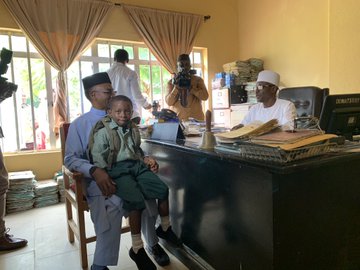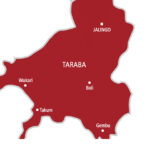Some parents whose children attend the Kaduna Capital School in the Malali area of the metropolis have reacted to Governor Nasir el-Rufai’s reasons for withdrawing his son from the school, saying the governor erred by not sharing the security threat with the school and parents.
Last year, the governor dramatically enrolled his son in one of northern Nigeria’s oldest public schools.
Daily Trust had reported how El-Rufai quietly withdrew his son.
Muyiwa Adekeye, the special adviser on media and communication to the governor, had remained mum when Daily Trust sought explanation on the governor’s action.
However, in an interview with BBC Pidgin, after publication of the story, El-Rufai said his son had been targeted by bandits because of his public stance against the payment of ransom.
In the interview, El-Rufai said it was the first time he would address the issue. He added that his daughter, Nesrin, was also enrolled in the school when she turned six.
He said although there was no threat to Nesrin, both children were removed from the school on the advice of security agencies.
“My son and my daughter were registered in the school because his sister became six and we had to register her.
“But we have had to temporarily withdraw them for the security of the school because we got intercepts from at least two groups that are planning to attack the school to kidnap my son.
“I don’t think they will succeed because there will be enough security there to prevent it, but other children may be placed in danger.
“We have no idea what weapons they will come with. I have taken a stand against paying bandits and at least three groups of bandits have been intercepted planning to go to the Kaduna Capital School and kidnap my son and ‘see if they catch my son, I go say I no go pay ransom?’” the governor said.
He assured that his decision was purely based on the safety of other children in the school, adding that he had enrolled his son in the school to prove to the people of Kaduna State that he had enough confidence in the public school system, and stressed that he intended to keep the promise.
However, some parents whose children still attend the school yesterday expressed disappointment at the governor’s action, saying he had portrayed his son as more important than other children in the school.
Reacting to the governor’s BBC Pidgin interview, Alhaji Badamasi Ibrahim, whose children attend Kaduna Capital School, said he was left with no choice but to either withdraw his children from the school or temporarily suspend their attendance now that he knows the school is a target.
“Honestly, I am in a dilemma because now that the governor has removed his son from the school, it means the other children are not safe. Should we also withdraw our children? Who will protect them?” He asked.
Alhaji Ibrahim further said he was excited when the governor enrolled his son in the school in 2019, adding, “I was so sure that the quality of education would improve, knowing that the governor would want the best for his son. But knowing that the boy no longer attends the school and hearing the governor’s reasons is demoralising.”
A female parent who asked to remain anonymous, however, commended El-Rufai’s boldness, saying his son’s presence may have put other children at risk.
She said, “The boy continued to attend the school until the threat came, so I think he did the right thing. His son’s presence is likely to put others at risk. Imagine the resources that go into protecting one boy in such a school?”
With the governor’s explanation, parents whose children were abducted in higher institutions within the state said his action brought back painful memories of the plight of their children.
One of such parents, who acted as the chairman of the parents of abducted students of the Federal College Forestry Mechanisation, Afaka, Abdullahi Usman, said the governor’s action showed his inability to protect his son, and therefore, cannot protect anyone else.
“As the chief security officer of the state, this means he cannot protect his own child’s school, how then can he protect other children. This means the government has failed in protecting the schools in the state,” he said.

 Join Daily Trust WhatsApp Community For Quick Access To News and Happenings Around You.
Join Daily Trust WhatsApp Community For Quick Access To News and Happenings Around You.


